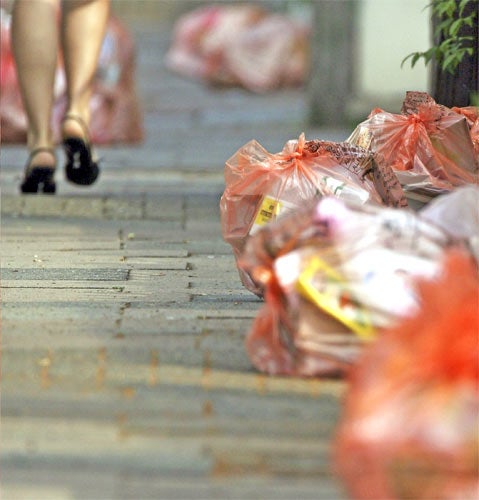Government dumps promise to provide weekly bin collections

Your support helps us to tell the story
From reproductive rights to climate change to Big Tech, The Independent is on the ground when the story is developing. Whether it's investigating the financials of Elon Musk's pro-Trump PAC or producing our latest documentary, 'The A Word', which shines a light on the American women fighting for reproductive rights, we know how important it is to parse out the facts from the messaging.
At such a critical moment in US history, we need reporters on the ground. Your donation allows us to keep sending journalists to speak to both sides of the story.
The Independent is trusted by Americans across the entire political spectrum. And unlike many other quality news outlets, we choose not to lock Americans out of our reporting and analysis with paywalls. We believe quality journalism should be available to everyone, paid for by those who can afford it.
Your support makes all the difference.Eric Pickles declared last year: "It's a basic right for every Englishman and woman to be able to put the remnants of their chicken tikka masala in their bin without having to wait two weeks for it to be collected."
But the Communities Secretary was eating his words yesterday after the Government executed a U-turn over its promise to ensure that rubbish would be picked up weekly from every address in the country.
The retreat came because of the cost of bringing back weekly rounds – estimated at more than £100m – and fears that the move would hit recycling levels. Ministers concluded it was not possible to force councils, half of which have some form of fortnightly collection, into line.
Mr Pickles looked on impassively as the Environment Secretary Caroline Spelman announced the U-turn in the Commons. But the package of measures fell well short of meeting the Tories' promise in opposition to restore weekly rounds – an omission that provoked heated clashes between the Cabinet colleagues.
A new waste strategy from Ms Spelman's department only said that the "public have a reasonable expectation that household-waste collections services should be weekly, particularly for smelly waste". Ms Spelman said £10m would be made available to councils to remove the most noxious food waste once a week and pledged to remove bureaucratic barriers that stopped councils from returning to weekly rounds.
Mr Pickles had previously denounced fortnightly collections as "unpopular and unhygienic" and claimed they were responsible for an "explosion" in the rat population.
But councils warned they would be hit by the cost of extra bin rounds and re-negotiating waste contracts – and the risk of higher landfill taxes and EU fines if recycling levels fell.
Ms Spelman said: "My department, in common with most departments, had to make some difficult choices and the public are well aware of that. Realistically we will do what we can.
"In the spirit of localism, central Government is all the time looking to enable local councils to respond to local needs and having a one-size-fits-all policy is not the right answer for that."
The retreat was mocked in the Commons, with the Labour MP for Exeter, Ben Bradshaw, taunting her: "Wasn't it always a nonsense for a Government to pay lip service to localism then in turn try to force local authorities to re-introduce weekly collections?"
John Woodcock, the Labour MP for Barrow and Furness, said: "Her Government promised they would bring back weekly bin collections across the country. Will she apologise to families who have been led up the garden path by what she said?"
John Redwood, a former Tory cabinet minister, said it was unacceptable to have rotting food waste "hanging around for up to two weeks in bins".
The strategy fulfilled a Tory manifesto promise by scrapping fines for "trivial" errors such as putting rubbish in the wrong containers or leaving dustbins open. Ministers had described the rules, which were introduced by Labour, as "bin taxes"; instead they will allow town halls to issue fixed-penalty notices of between £75 and £100 only to people who allow rubbish to pile up or for fly-tipping.
The Government will consult on introducing landfill restrictions on wood waste and review the case for bringing in landfill bans on other materials including metals, textiles and biodegradable waste. It also announced an action plan on anaerobic digestion, a process which can turn food and farm waste into energy, with the aim of encouraging the fledgling industry, creating "green" jobs and producing environmentally friendly energy.
Julian Kirby, of Friends of the Earth, said: "Cash-strapped councils will be relieved ministers have ditched ludicrous proposals to force them to provide weekly bin rounds – fortnightly collections are cheaper."
Join our commenting forum
Join thought-provoking conversations, follow other Independent readers and see their replies
Comments